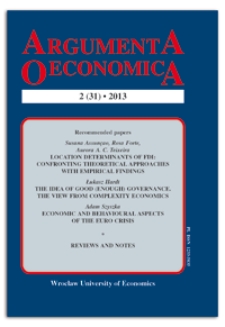Dolnośląska Biblioteka Cyfrowa udostępnia 109 805 obiektów cyfrowych
Obiekt
Tytuł: Economic and behavioural aspects of the Euro crisis
Autor:
Opis:
Argumenta Oeconomica, 2013, Nr 2 (31), s. 49-74
Abstrakt:
Wydawca:
Wydawnictwo Uniwersytetu Ekonomicznego we Wrocławiu
Miejsce wydania:
Data wydania:
Typ zasobu:
Identyfikator zasobu:
Język:
Powiązania:
Argumenta Oeconomica, 2013, Nr 2 (31)
Prawa:
Wszystkie prawa zastrzeżone (Copyright)
Prawa dostępu:
Dla wszystkich w zakresie dozwolonego użytku
Lokalizacja oryginału:
Kolekcje, do których przypisany jest obiekt:
- Dolnośląska Biblioteka Cyfrowa > Uczestnicy Konsorcjum > 04. Uniwersytet Ekonomiczny we Wrocławiu > Czasopisma wydawane przez Wydawnictwo UEW > Argumenta Oeconomica
- Dolnośląska Biblioteka Cyfrowa > Zasoby > 2. Czasopisma > Czasopisma współczesne
Data ostatniej modyfikacji:
26 maj 2022
Data dodania obiektu:
28 lis 2016
Liczba wyświetleń treści obiektu:
154
Liczba wyświetleń treści obiektu w formacie PDF
199
Wszystkie dostępne wersje tego obiektu:
https://www.dbc.wroc.pl/publication/38988
Wyświetl opis w formacie RDF:
Wyświetl opis w formacie OAI-PMH:
| Nazwa wydania | Data |
|---|---|
| Economic and behavioural aspects of the Euro crisis | 26 maj 2022 |
Obiekty Podobne
Rubaj, Piotr
Michalczyk, Wawrzyniec
Walkowski, Maciej
Pluciński, Eugeniusz M.
























